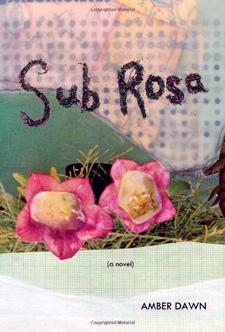
Credit: Sarah Race
Amber Dawn takes us to a dark and magical place in her debut novel, Sub Rosa.
She has been compared to Lewis Carroll, with her story of a magical parallel city. This comparison weighs heavily on the text, but to Dawn’s credit, she overcomes the baggage admirably. She renders believable characters and applies dazzlingly descriptive brush strokes in this tough, sex-filled story of magical prostitutes. Dawn’s prose, in a word, sings.
However, Sub Rosa is more like JK Rowling’s Harry Potter or Neil Gaiman’s Neverwhere than Alice in Wonderland.
The protagonist, a barfly moocher, gets the chance to hook in Sub Rosa, a magical neighbourhood. But it’s not all good news. To get to Rosa, our hero must first work in the Dark — a kind of endless night inhabited by lurking zombie men. Physical peril and rape are near certainties.
Dawn describes Sub Rosa’s Glories, the resident prostitutes, being called on by johns, or “live ones”:
“The orphans positioned themselves in their abridged line until, one-by-one, live ones picked them off like dolls off a toy-store shelf.”
But this is a story of magic with a steely edge. It features more than illuminating phrases.
“The man below me wasn’t loud either; like a small dog dreaming, he made only little whimpers and growls. I was as far away from him as I could be; my head grazed the ceiling as he lifted his body up to me. It occurred to me that I should have touched this man. At least run my fingers through his hair.”
Elsewhere, the heroine reunites with her Daddy.
“He kissed me. . . as I pried at his heavy leather belt. I wrestled his pants down with my feet. The hall closet doors rattled furiously as we fucked.”
Even while laden with hetero sex, lesbian and bi love permeates Rosa. The heroine crushes on another Glory. The women often kiss intimately and admit they love each other.
That said, there is an unrelenting undercurrent of dread. The characters swap contradictory legends about the Glories who started Rosa, casting its origins in murky light. Nobody agrees on exactly what the zombie men are.
Readers may be slightly uncomfortable with the protagonist. Although she trades in deception, she is a compelling figure, even as she tries to piece together her foggy past. When she starts a Cherished Memories Club, though, one recalls Potter’s Order of the Phoenix.
The elements don’t always fully succeed. After all the tension and myth-hinting surrounding the Dark, there isn’t enough delving into the Dark itself. The potential of this lurking mass of blackness feels untapped.
Nonetheless, Sub Rosa is an enormous satisfaction, an immersion in gritty magical realism. You want the heroine to hold on to her unicorn belt buckle, a trapping of adolescence, even while she lies and manipulates her so-called friends. The ending doesn’t draw a diagram or cuddle up with readers, either. Like the neighbourhood, the finale possesses a dark magical poetry all its own.


 Why you can trust Xtra
Why you can trust Xtra


